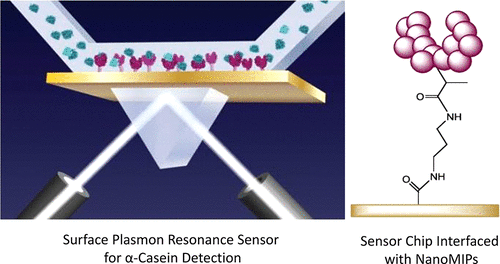Our official English website, www.x-mol.net, welcomes your
feedback! (Note: you will need to create a separate account there.)
Synthesis of Molecularly Imprinted Polymer Nanoparticles for α-Casein Detection Using Surface Plasmon Resonance as a Milk Allergen Sensor
ACS Sensors ( IF 8.2 ) Pub Date : 2018-01-26 00:00:00 , DOI: 10.1021/acssensors.7b00850 Jon Ashley 1 , Yunus Shukor 2 , Roberta D’Aurelio 1 , Linda Trinh 3 , Thomas L. Rodgers 3 , Jeff Temblay 4 , Mike Pleasants 4 , Ibtisam E. Tothill 1
ACS Sensors ( IF 8.2 ) Pub Date : 2018-01-26 00:00:00 , DOI: 10.1021/acssensors.7b00850 Jon Ashley 1 , Yunus Shukor 2 , Roberta D’Aurelio 1 , Linda Trinh 3 , Thomas L. Rodgers 3 , Jeff Temblay 4 , Mike Pleasants 4 , Ibtisam E. Tothill 1
Affiliation

|
Food recalls due to undeclared allergens or contamination are costly to the food manufacturing industry worldwide. As the industry strives for better manufacturing efficiencies over a diverse range of food products, there is a need for the development of new analytical techniques to improve monitoring of the presence of unintended food allergens during the food manufacturing process. In particular, the monitoring of wash samples from cleaning in place systems (CIP), used in the cleaning of food processing equipment, would allow for the effective removal of allergen containing ingredients in between food batches. Casein proteins constitute the biggest group of proteins in milk and hence are the most common milk protein allergen in food ingredients. As such, these proteins could present an ideal analyte for cleaning validation. In this work, molecularly imprinted polymer nanoparticles (nanoMIPs) with high affinity toward bovine α-casein were synthesized using a solid-phase imprinting method. The nanoMIPs were then characterized and incorporated into label free surface plasmon resonance (SPR) based sensor. The nanoMIPs demonstrated good binding affinity and selectivity toward α-casein (KD ∼ 10 × 10–9 M). This simple affinity sensor demonstrated the quantitative detection of α-casein achieving a detection limit of 127 ± 97.6 ng mL–1 (0.127 ppm) which is far superior to existing commercially available ELISA kits. Recoveries from spiked CIP wastewater samples were within the acceptable range (87–120%). The reported sensor could allow food manufacturers to adequately monitor and manage food allergen risk in food processing environments while ensuring that the food produced is safe for the consumer.
中文翻译:

表面等离子体共振作为牛奶过敏原传感器的α-酪蛋白检测分子印迹聚合物纳米粒子的合成。
由于未声明的过敏原或污染而导致的食品召回对全球食品制造行业造成了巨大的损失。随着该行业努力在多种食品上提高生产效率,需要开发新的分析技术以改进对食品制造过程中意外食品过敏原的存在的监测。特别地,对用于食品加工设备清洁的原位清洁系统(CIP)中的洗涤样品进行监控,可以有效去除食品批次之间的含过敏原成分。酪蛋白蛋白质构成牛奶中最大的蛋白质组,因此是食品成分中最常见的牛奶蛋白质过敏原。这样,这些蛋白质可以提供用于清洁验证的理想分析物。在这项工作中,使用固相印迹法合成了对牛α-酪蛋白具有高亲和力的分子印迹聚合物纳米颗粒(nanoMIPs)。然后对nanoMIP进行表征,并结合到基于无标记表面等离振子共振(SPR)的传感器中。nanoMIPs对α-酪蛋白具有良好的结合亲和力和选择性(ķ d〜10×10 -9 M)。这种简单的亲和力传感器证明了对α-酪蛋白的定量检测,检测限达到127±97.6 ng mL –1(0.127 ppm),远远优于现有的市售ELISA试剂盒。加标CIP废水样品的回收率在可接受范围内(87-120%)。报告的传感器可以使食品制造商在食品加工环境中充分监视和管理食品过敏原的风险,同时确保所生产的食品对消费者而言是安全的。
更新日期:2018-01-26
中文翻译:

表面等离子体共振作为牛奶过敏原传感器的α-酪蛋白检测分子印迹聚合物纳米粒子的合成。
由于未声明的过敏原或污染而导致的食品召回对全球食品制造行业造成了巨大的损失。随着该行业努力在多种食品上提高生产效率,需要开发新的分析技术以改进对食品制造过程中意外食品过敏原的存在的监测。特别地,对用于食品加工设备清洁的原位清洁系统(CIP)中的洗涤样品进行监控,可以有效去除食品批次之间的含过敏原成分。酪蛋白蛋白质构成牛奶中最大的蛋白质组,因此是食品成分中最常见的牛奶蛋白质过敏原。这样,这些蛋白质可以提供用于清洁验证的理想分析物。在这项工作中,使用固相印迹法合成了对牛α-酪蛋白具有高亲和力的分子印迹聚合物纳米颗粒(nanoMIPs)。然后对nanoMIP进行表征,并结合到基于无标记表面等离振子共振(SPR)的传感器中。nanoMIPs对α-酪蛋白具有良好的结合亲和力和选择性(ķ d〜10×10 -9 M)。这种简单的亲和力传感器证明了对α-酪蛋白的定量检测,检测限达到127±97.6 ng mL –1(0.127 ppm),远远优于现有的市售ELISA试剂盒。加标CIP废水样品的回收率在可接受范围内(87-120%)。报告的传感器可以使食品制造商在食品加工环境中充分监视和管理食品过敏原的风险,同时确保所生产的食品对消费者而言是安全的。











































 京公网安备 11010802027423号
京公网安备 11010802027423号